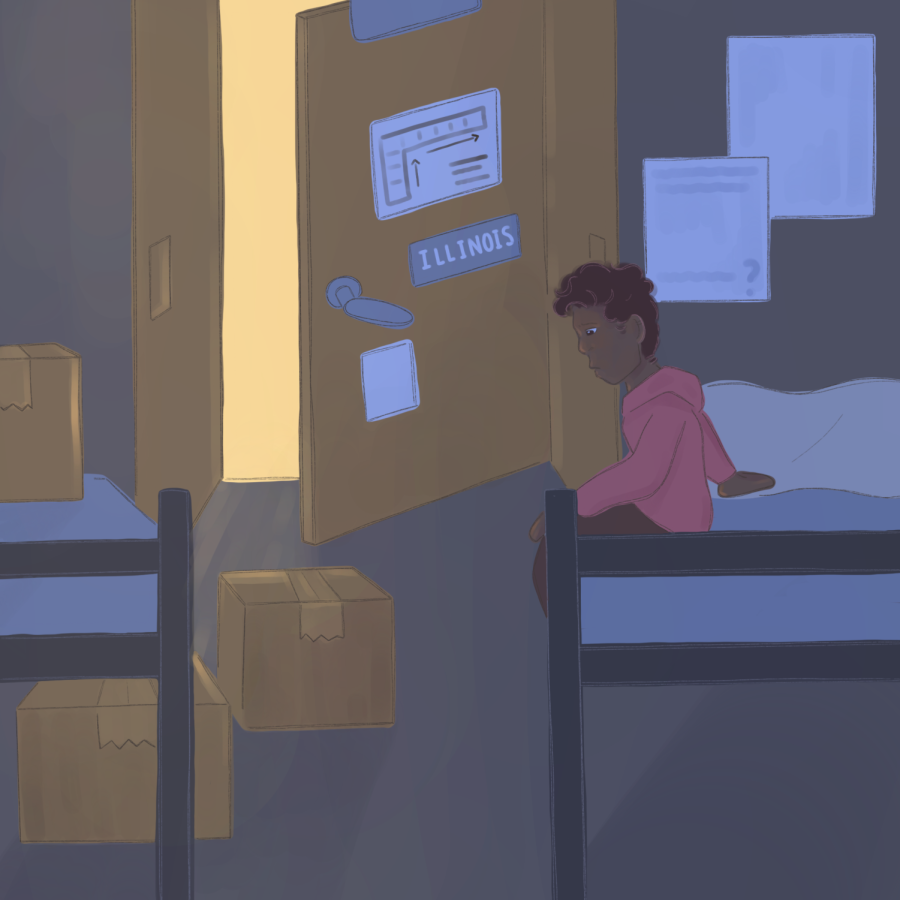Sudden roommate changes bring confusion, stress
March 2, 2023
Moving onto a university campus is a huge and daunting task for some students. The process of picking a roommate follows prospective students until it is time to finalize their choice.
An individual could choose a random roommate, they could room with someone they know or they can choose to live alone if they’re lucky enough to get a single room. What many people tend to overlook is the possibility of having that roommate, if they so choose to have one, leave.
Many students whose roommate leaves mid-semester find themselves in a state of stress or confusion. What comes next? Some students at the University who have had their roommate drop out or unexpectedly switch rooms have criticisms of University Housing’s approach.
Meghan Flannery, freshman in LAS, had been living in a triple dorm with two roommates until one dropped out near Labor Day weekend for uncontrollable reasons. Flannery said that the change was emotional and stress inducing.
“I was literally crying,” Flannery said. “We obviously only knew each other for some weeks, but we bonded so much. Honestly, I was having trouble making friends in college anyways, and then I met her. And then she’s like, ‘Oh, I’m not going to be here anymore.’”
Get The Daily Illini in your inbox!
Students have to deal with the emotional distress of having another sudden change occur in a short period of time. Still, University Housing’s presence, or lack thereof, may inflict more stress on students, Flannery said.
“With the whole roommate issues, (housing) really doesn’t make an effort,” Flannery said. “They never said anything afterwards to me after my roommate dropped out. Nobody did anything other than my RA.”
Flannery acknowledged that with the size of the University, it can be challenging for housing officials to be involved in everyone’s unique roommate dilemmas. Still, Flannery said she wished University Housing would have been more involved and would have given more information.
However, not all students have complaints about the laissez-faire, relaxed approach that housing staff takes with students in similar situations.
Joshua McWhorter, freshman in Media, had no critiques on the move-out process he experienced with his roommate, who moved out in October.
A few days after his roommate left, McWhorter received an email from housing about the options for the vacant space in his room. He decided to leave the space open for another potential roommate, but months later, he is still living in a single dorm.
“Other than the email, I didn’t hear anything from housing,” McWhorter said. “I didn’t really need support. I was just chilling with the whole thing.”
While some students may need a sense of involvement to lead them through the confusion, McWhorter said he felt the approach from University Housing was for the best.
One way of making this transition less stressful could be a change of perspective, which is what McWhorter did when dealing with the absence of his former roommate.
“I didn’t see it as losing a friend,” McWhorter said. “I saw it as gaining my own space.”
One of the only steps that University Housing takes is sending an email to students about their vacant spaces, but for some students, that hasn’t been the case.
Andee Erickson, freshman in LAS, had her roommate switch to a single dorm during the third week of her first semester.
Her former roommate did not notify her that she was leaving until Erickson came back to the dorm one day to find her ex-roommates belongings gone.
The University had not notified Erickson that her roommate was leaving in time for her to prepare, and she did not get the confirmation email until days later.
“You should notify people when that’s happening,” Erickson said. “I asked my RA about if someone does move out, and she said that they’ll try to notify me, but that it is not a guarantee.”
A similar situation occurred with Flannery, except she did not receive an email until months after their roommate had left.
“(Housing) said nothing,” Flannery said. “We had to wait months to get the email about them asking, ‘Do you want this to be triple or double?’ So, we were living for multiple months just confused about what was going on.”
Flannery said the lack of communication caused her to worry about whether she would suddenly have another roommate without warning.
She said she thinks students should not need to feel alone in the process of figuring out what their living situations will be like.
“If you have an adverse reaction or something, there’s so many different mental health places for us to go to even within the buildings in some cases,” Flannery said. “I would just say use all your resources. Just understand that this is a really sucky situation that you’re going through, and that’s OK.”
Who your roommate will end up being may seem like a life or death to some students, but McWhorter stressed the importance of being flexible during that time.
“Be open to everything,” McWhorter said. “Just because your roommate drops out does not guarantee that the space will be vacant. So, if someone moves in or if no one moves in, just be open and go through the process.”







